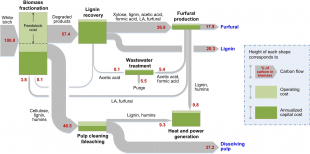Location:
Sanderson Building, Classroom 2
Date:
Process Systems Engineering for Renewable Energy
Abstract:
We discuss how process systems engineering studies can facilitate the development of novel strategies for the production of renewable fuels and chemicals. First, we present process synthesis studies for catalytic biomass-to-fuels processes, and illustrate how systems-level analyses can be coupled with experimental heterogeneous catalysis studies to identify promising research directions. Second, we develop a general framework for process synthesis where surrogate unit models for novel technologies are generated using experimental data or offline simulations and employed for the development of integrated processes; we discuss the application of the proposed framework to a number of renewable energy applications. Finally, we present an optimization-based framework for the assessment of biofuel strategies. Specifically, we generate a technology superstructure that consists of a wide range of technologies and formulate optimization models that allow us to: (i) evaluate alternative strategies, (ii) identify the major technological and cost drivers, and (iii) quantify the impact of uncertainty.
Bio:
Dr. Maravelias is a Vilas Distinguished Achievement Professor and Executive Officer of the Department of Chemical and Biological Engineering at the University of Wisconsin – Madison. His research interests lie in the areas of a) chemical production scheduling, b) supply chain optimization, c) chemical process synthesis and analysis, and d) computational methods for material discovery. Among others, he has received an NSF CAREER award, as well as the 2008 David Smith and the 2013 Outstanding Young Researcher awards from the American Institute of Chemical Engineers.
Event Contact Name:
Francisco Garcia Garcia



